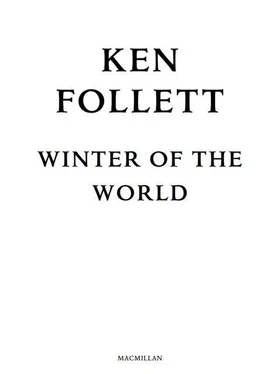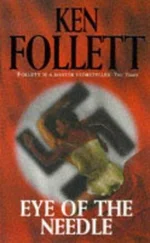Ken Follett - Winter of the World (Century Trilogy 2)
Здесь есть возможность читать онлайн «Ken Follett - Winter of the World (Century Trilogy 2)» весь текст электронной книги совершенно бесплатно (целиком полную версию без сокращений). В некоторых случаях можно слушать аудио, скачать через торрент в формате fb2 и присутствует краткое содержание. Жанр: Старинная литература, на английском языке. Описание произведения, (предисловие) а так же отзывы посетителей доступны на портале библиотеки ЛибКат.
- Название:Winter of the World (Century Trilogy 2)
- Автор:
- Жанр:
- Год:неизвестен
- ISBN:нет данных
- Рейтинг книги:5 / 5. Голосов: 2
-
Избранное:Добавить в избранное
- Отзывы:
-
Ваша оценка:
- 100
- 1
- 2
- 3
- 4
- 5
Winter of the World (Century Trilogy 2): краткое содержание, описание и аннотация
Предлагаем к чтению аннотацию, описание, краткое содержание или предисловие (зависит от того, что написал сам автор книги «Winter of the World (Century Trilogy 2)»). Если вы не нашли необходимую информацию о книге — напишите в комментариях, мы постараемся отыскать её.
Winter of the World (Century Trilogy 2) — читать онлайн бесплатно полную книгу (весь текст) целиком
Ниже представлен текст книги, разбитый по страницам. Система сохранения места последней прочитанной страницы, позволяет с удобством читать онлайн бесплатно книгу «Winter of the World (Century Trilogy 2)», без необходимости каждый раз заново искать на чём Вы остановились. Поставьте закладку, и сможете в любой момент перейти на страницу, на которой закончили чтение.
Интервал:
Закладка:
Maud chuckled. ‘You can imagine how pleased I was about that!’
Lloyd looked into his coffee, feeling embarrassed. He was eighteen and a virgin, and honeymoon jokes made him uncomfortable.
More sombrely, Ethel asked Maud: ‘Do you ever hear from Fitz these days?’
Lloyd knew that the secret wedding had caused a terrible rift between Maud and her brother, Earl Fitzherbert. Fitz had disowned her because she had not gone to him, as head of the family, and asked his permission to marry.
Maud shook her head sadly. ‘I wrote to him that time we went to London, but he refused even to see me. I hurt his pride by marrying Walter without telling him. My brother is an unforgiving man, I’m afraid.’
Ethel paid the bill. Everything in Germany was cheap if you had foreign currency. They were about to get up and leave when a stranger came to the table and, uninvited, pulled up a chair. He was a heavy man with a small moustache in the middle of a round face.
He wore a Brownshirt uniform.
Robert said coldly: ‘What may I do for you, sir?’
‘My name is Criminal Commissar Thomas Macke.’ He grabbed a passing waiter by the arm and said: ‘Bring me a coffee.’
The waiter looked enquiringly at Robert, who nodded.
‘I work in the political department of the Prussian police,’ Macke went on. ‘I am in charge of the Berlin intelligence section.’
Lloyd translated for his mother in a low voice.
‘However,’ said Macke, ‘I wish to speak to the proprietor of the restaurant about a personal matter.’
Robert said: ‘Where did you work a month ago?’
The unexpected question startled Macke, and he replied immediately: ‘At the police station in Kreuzberg.’
‘And what was your job there?’
‘I was in charge of records. Why do you ask?’
Robert nodded as if he had expected something like this. ‘So you have gone from a job as a filing clerk to head of the Berlin intelligence section. Congratulations on your rapid promotion.’ He turned to Ethel. ‘When Hitler became Chancellor at the end of January, his henchman Hermann Göring took the role of Interior Minister of Prussia – in charge of the largest police force in the world. Since then, Göring has been firing policemen wholesale and replacing them with Nazis.’ He turned back to Macke and said sarcastically: ‘However, in the case of our surprise guest I’m sure the promotion was purely on merit.’
Macke flushed, but kept his temper. ‘As I said, I wish to speak to the proprietor about something personal.’
‘Please come and see me in the morning. Would ten o’clock suit you?’
Macke ignored this suggestion. ‘My brother is in the restaurant business,’ he ploughed on.
‘Ah! Perhaps I know him. Macke is the name? What kind of establishment does he run?’
‘A small place for working men in Friedrichshain.’
‘Ah. Then it isn’t likely that I have met him.’
Lloyd was not sure that it was wise for Robert to be so waspish. Macke was rude, and did not deserve kindness, but he could probably make serious trouble.
Macke went on: ‘My brother would like to buy this restaurant.’
‘Your brother wants to move up in the world, as you have.’
‘We are prepared to offer you twenty thousand marks, payable over two years.’
Jörg burst out laughing.
Robert said: ‘Permit me to explain something to you, Commissar. I am an Austrian count. Twenty years ago, I had a castle and a large country estate in Hungary where my mother and sister lived. In the war I lost my family, my castle, my lands, and even my country, which was . . . miniaturized.’ His tone of amused sarcasm had gone, and his voice became gruff with emotion. ‘I came to Berlin with nothing but the address of Walter von Ulrich, my distant cousin. Nevertheless, I managed to open this restaurant.’ He swallowed. ‘It is all I have.’ He paused, and drank some coffee. The others around the table were silent. He regained his poise, and something of his superior tone of voice. ‘Even if you offered a generous price – which you have not – I would still refuse, because I would be selling my whole life. I have no wish to be rude to you, even though you have behaved unpleasantly. But my restaurant is not for sale at any price.’ He stood up and held out his hand to shake. ‘Goodnight, Commissar Macke.’
Macke automatically shook hands, then looked as if he regretted it. He stood up, clearly angry. His fat face was a purplish colour. ‘We will talk again,’ he said, and he walked out.
‘What an oaf,’ said Jörg.
Walter said to Ethel: ‘You see what we have to put up with? Just because he wears that uniform, he can do anything he likes!’
What had bothered Lloyd was Macke’s confidence. He had seemed to feel sure that he could buy the restaurant at the price he named. He reacted to Robert’s refusal as if it was no more than a temporary setback. Were the Nazis already so powerful?
This was the kind of thing Oswald Mosley and his British Fascists wanted – a country in which the rule of law was replaced by bullying and beating. How could people be so damn stupid?
They put on their coats and hats and said goodnight to Robert and Jörg. As soon as they stepped outside, Lloyd smelled smoke – not tobacco, but something else. The four of them got into Walter’s car, a BMW Dixi 3/15, which Lloyd knew was a German-manufactured Austin Seven.
As they drove through the Tiergarten park, two fire engines overtook them, bells clanging. ‘I wonder where the fire is,’ said Walter.
A moment later, they saw the glow of flames through the trees. Maud said: ‘It seems to be near the Reichstag.’
Walter’s tone changed. ‘We’d better take a look,’ he said worriedly, and he made a sudden turn.
The smell of smoke grew stronger. Over the tops of the trees Lloyd could see flames shooting skywards. ‘It’s a big fire,’ he said.
They emerged from the park on to the Königs Platz, the broad plaza between the Reichstag building and the Kroll Opera House opposite. The Reichstag was ablaze. Red and yellow light danced behind the classical rows of windows. Flame and smoke jetted up through the central dome. ‘Oh, no!’ said Walter, and to Lloyd he sounded stricken with grief. ‘Oh, God in heaven, no.’
He stopped the car and they all got out.
‘This is a catastrophe,’ said Walter.
Ethel said: ‘Such a beautiful old building.’
‘I don’t care about the building,’ Walter said surprisingly. ‘It’s our democracy that’s on fire.’
A small crowd watched from a distance of about fifty yards. In front of the building, fire engines were lined up, their hoses already playing on the flames, water jetting in through broken windows. A handful of policemen stood around doing nothing. Walter spoke to one of them. ‘I am a Reichstag deputy,’ he said. ‘When did this start?’
‘An hour ago,’ the policeman said. ‘We’ve got one of them that did it – a man with nothing on but his trousers! He used his clothes to start the fire.’
‘You should put up a rope cordon,’ Walter said with authority. ‘Keep people at a safe distance.’
‘Yes, sir,’ said the policeman, and went off.
Lloyd slipped away from the others and moved nearer to the building. The firemen were bringing the blaze under control: there was less flame and more smoke. He walked past the fire engines and approached a window. It did not seem very dangerous, and anyway his curiosity overcame his sense of self-preservation – as usual.
When he peered through a window he saw that the destruction was severe: walls and ceilings had collapsed into piles of rubble. As well as firemen he saw civilians in coats – presumably Reichstag officials – moving around in the debris, assessing the damage. Lloyd went to the entrance and climbed the steps.
Читать дальшеИнтервал:
Закладка:
Похожие книги на «Winter of the World (Century Trilogy 2)»
Представляем Вашему вниманию похожие книги на «Winter of the World (Century Trilogy 2)» списком для выбора. Мы отобрали схожую по названию и смыслу литературу в надежде предоставить читателям больше вариантов отыскать новые, интересные, ещё непрочитанные произведения.
Обсуждение, отзывы о книге «Winter of the World (Century Trilogy 2)» и просто собственные мнения читателей. Оставьте ваши комментарии, напишите, что Вы думаете о произведении, его смысле или главных героях. Укажите что конкретно понравилось, а что нет, и почему Вы так считаете.












